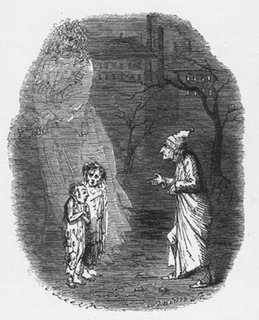"the surplus population"

posted by k
I like to return to Dickens' A Christmas Carol at Christmas. I grew up watching Alastair Sim as Scrooge and read the original story early on. It's harder-edged and more political than most of the film versions.
These days, it's usual to groan at the sentimentality of Tiny Tim, the boy who will never grow to adulthood unless Scrooge intervenes and becomes a good employer. But for Victorian readers, Tim wasn't just one golden-haired boy who could be the focus of charitable giving. Tim stood against the views of Malthus and those who took a purely economic view of the world.
Asked to donate to charity, Scrooge recommends the workhouse. Told that the poor would rather die than go there, Scrooge replies, "If they would rather die ... thet had better do it, and decrease the surplus population." The "surplus population", according to political economists of the day, were those incapable of economic activity. In economic terms, they were be better off dead. When he encounters Tim, Scrooge finds that the surplus population has a human face, and changes his views.
 Scrooge doesn't just encounter one pretty child, however. He also meets two ugly children, hidden beneath the cloak of the Spirit of Christmas Present. These children are Ignorance and Want and Scrooge has to learn that these too are his responsibility - his children. He has to face a general responsibility as well as a particular concern.
Scrooge doesn't just encounter one pretty child, however. He also meets two ugly children, hidden beneath the cloak of the Spirit of Christmas Present. These children are Ignorance and Want and Scrooge has to learn that these too are his responsibility - his children. He has to face a general responsibility as well as a particular concern.Today, we see too much in economic terms - as though money were the only measure of value. We're asked to argue about the economic value of migrants, as though friendships and cultural enrichment counted for nothing. Education and health are measured by their monetary value. Our children are valued not for their kindness, their ideas or themselves but their potential value to future employers. Skills are exalted above thought and questioning because skills are marketable.
Today, in the Guardian, ex-Python Terry Jones takes this monetary approach to its logical conclusion. Seeing human lives - and deaths - in accountants' terms should be an absurdity. Tomorrow we might miss the irony.


0 Comments:
Post a Comment
<< Home